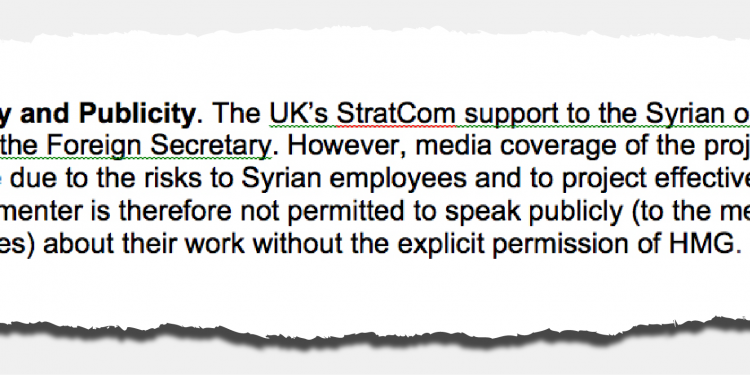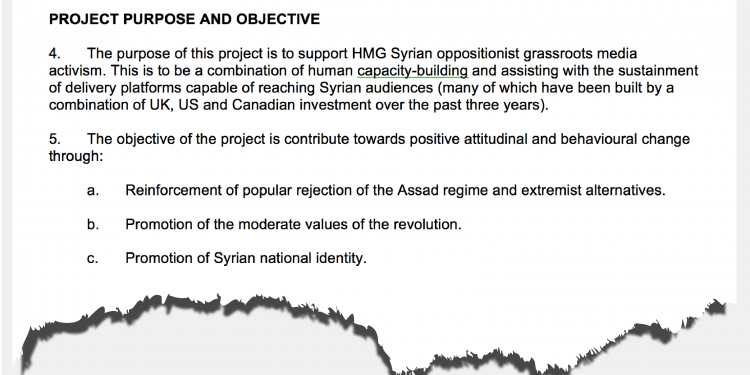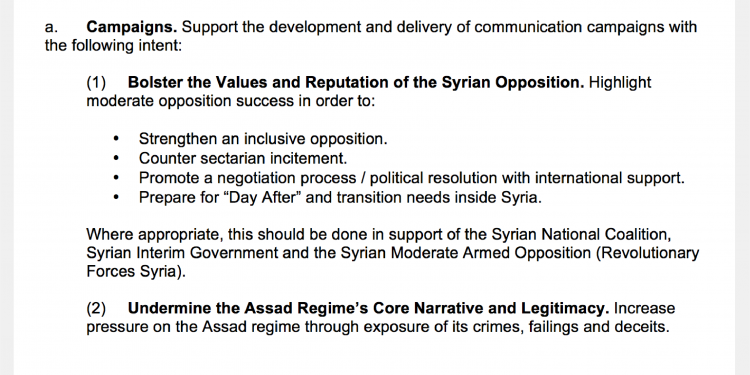CENTRAL NEWS
The British government covertly established a network of ‘citizen journalists’ across Syria during the early years of the country’s civil war in an attempt to shape perceptions of the conflict, it was revealed by the Middle East Eye. The people who were being recruited were unaware that they were being directed from London as a party to a psychological operation mapped to manipulate the peoples of Syria, as well as to control the perception of Syria being advertised to the rest of the world.
A number of leaked documents seen by Middle East Eye show how the perception operation began in 2012 and gathered pace the following year, shortly after the UK parliament refused to authorise British military action in Syria. “Drawing upon British, American and Canadian funding, UK government contractors set up offices in Istanbul and Amman, where they hired members of the Syrian diaspora, who in turn recruited citizen journalists inside Syria,” the agency reported.
These journalists were commissioned to produce TV footage, radio programmes, social media, posters, magazines and even children’s comics, all within the framework of reducing Assad’s legitimacy and narrative. The participants of the operation, or the citizen journalists as otherwise described, were oblivious to the operation they had become a party to, using equipment that they believed was being supplied by opposition groups but which had in fact been bought using funds supplied by the UK government as part of the contract.
Some would be paid a retainer of between $250-$500 a month, while others were paid for individual pieces of media – around $50 for each picture or $200 for a short piece of video. These would then be distributed to Arabic language media organisations, through what purported to be the press offices of Syrian opposition groups.
Those who were aware of the contract were silenced by a non-disclosure agreement:
“The implementer is not permitted to speak publicly (to the media or at academic conferences) about their work without the explicit permission of HMG [Her Majesty’s Government]. This will be enforced by a Non-Disclosure Agreement.”
The papers, drawn up by an anthropologist working in counter-terrorism at the foreign office in London, claim that “the objective of the project is contributing towards positive attitudinal and behavioural change.” This was further defined as: “Reinforcement of popular rejection of the Assad regime and extremist alternatives; promotion of the moderate values of the revolution; promotion of Syrian national identity.”
The operation, launched in order to protect the UK’s strategic interests in Syria and the Middle East, claims to promote “support for a political solution to the conflict, the alleviation of humanitarian suffering, and enhanced UK security.”
Although the contracts were awarded to various companies by the UK’s foreign office, they were managed by the country’s Ministry of Defence, and sometimes by military intelligence officers. These companies set up offices in Amman, Istanbul and, for a period, at Reyhanli in southeast Turkey. From here they would employ Syrians who would in turn recruit citizen journalists inside Syria, who were under the impression that they were working for the media offices of Syrian opposition groups.
Opposition social media accounts
Meanwhile, other leaked documents seen by MEE show that the British government had awarded contracts to communications companies, which selected and trained opposition spokespeople, ran press offices that operated 24 hours a day, and developed opposition social media accounts.
British staff running these offices were told that their Syrian employees were permitted to talk to British journalists – as spokespeople for the Syrian opposition – but only after receiving clearance from officials at the British consulate in Istanbul.
One of the responsibilities of the press offices set up covertly by the British government under the terms of these contracts was to “maintain an effective network of correspondents/stringers inside Syria to report on MAO [moderate armed opposition] activity”.
People involved with the operation say that some prominent British journalists visiting Istanbul would be introduced to Syrians acting as opposition spokespeople, who had been prepared for the encounter by British handlers. “They say they would brief the Syrians before the meeting, and avoid any face-to-face contact with the visiting journalists themselves,” it was revealed.
The British government appears to have regarded its propaganda initiative as being in part a way to maintain a presence in Syria until it was able to become militarily engaged, with the blueprint saying that it should have “the capability to expand back into the strategy as and when the opportunity arises, to help build an effective opposition political-military interface”.







